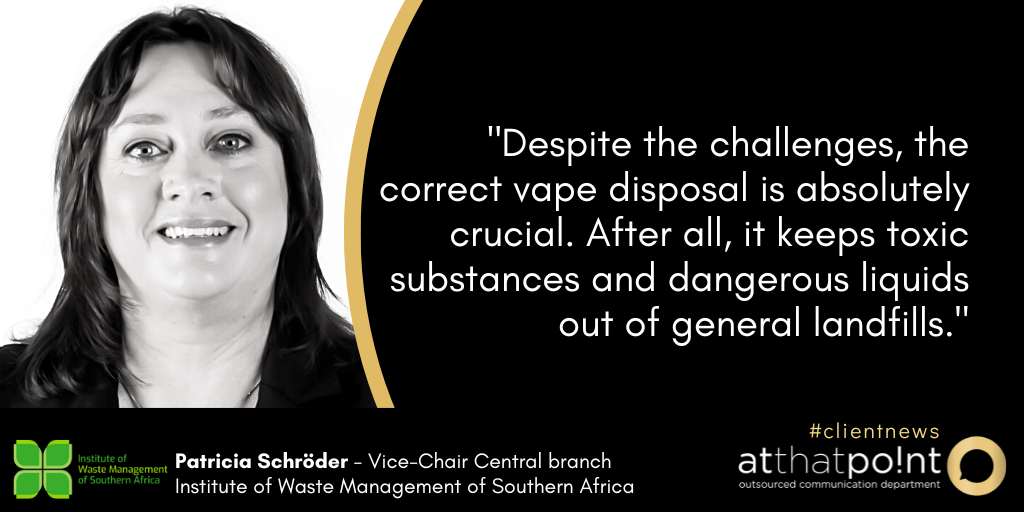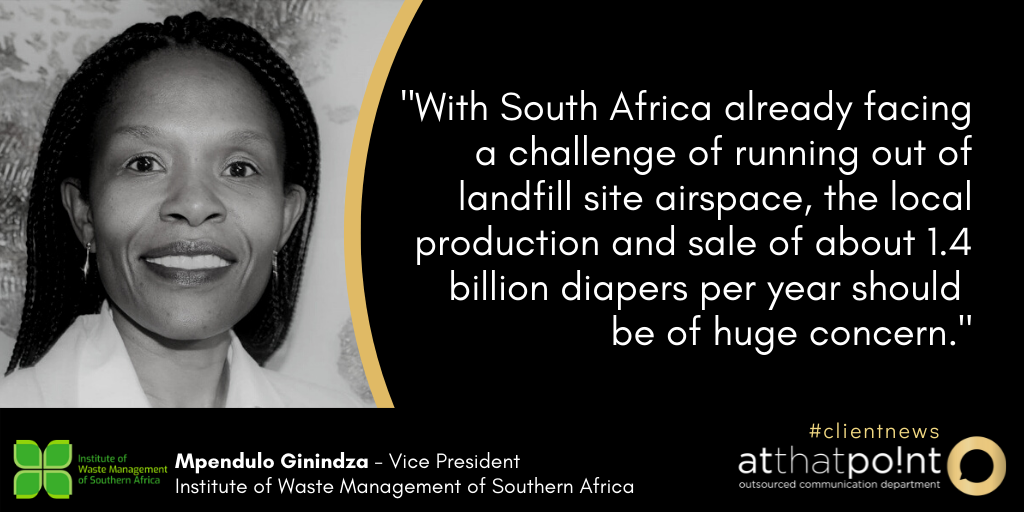 As vaping grows in popularity, unfortunately so does the harm it causes to the environment. It is especially trendy amongst younger users, though many seem to be unaware that vapes are actually electronic waste, cautions Patricia Schröder, Vice President at The Institute of Waste Management of Southern Africa (IWMSA). Toxin leaks due to incorrect disposal can be hazardous A "vape," or electronic cigarette, is a device that heats up a liquid to create a vapor that the user then inhales. Since they have a heating element and lithium-ion batteries, vapes are considered e-waste. But vape waste disposal is a big undertaking, because of the many chemicals and materials that are used in them. “Despite the challenges, the correct vape disposal is absolutely crucial. After all, it keeps toxic substances and dangerous liquids out of general landfills,” explains Schröder. “Even in the form of residues, these toxins can leak into natural habitats and river systems, where they can eventually contaminate our freshwater sources.” She says these dangerous elements can, however, be kept out of the environment by recycling and good product management. “Additionally, the materials, including the harmful components, can be recovered for use in other applications.” Informed users are responsible users Schröder notes that all electronic waste was banned from landfills in August 2021. “And due to the fact that vape cartridges contain both electronic components and packaging, they are included in this legislation. However, there is definitely still a need for greater acceptance and understanding on the part of both manufacturers and consumers.” She says vapers should ensure their disposable cartridges are collected through a “Mandatory Take Back-program” and then delivered to a recycling facility for environmentally sound management of the waste and to recover resources. “Return the used vape cartridges to the merchants who sold them, and preferably, only support vendors that will properly manage the vape cartridges and have proof of this,” she elaborates. “Under no circumstance dispose of your vape cartridges in normal waste bins as these go to general landfill and will cause pollution of this environment.” According to Schröder, so-called “end-of-life care” and recycling of vape goods are specialised tasks that call for very specific technology, expertise, and management approaches. “It is the only way we can ensure environmentally sound management that does not adversely affect the environment or the handlers of the waste products.” ENDS MEDIA CONTACT: Rosa-Mari Le Roux, [email protected], 060 995 6277, www.atthatpoint.co.za For more information on IWMSA please visit: Website: http://www.iwmsa.co.za/ Twitter: @IWMSA LinkedIn: Institute of Waste Management of Southern Africa Facebook: Institute of Waste Management of Southern Africa
0 Comments
Disposable Nappies take centuries to disintegrate - A Call for Action to Manufacturers and Consumers4/7/2022  In a landfill, a single disposable diaper can take 200 to 500 years to disintegrate. “With South Africa already facing a challenge of running out of landfill site airspace, the local production and sale of about 1.4 billion diapers per year should be of huge concern,” warns Mpendulo Ginindza, Vice President of the Institute of Waste Management of Southern Africa (IWMSA). “A child using disposable diapers is believed to produce up to 900 kg of nappy waste in the first two years of life.” Ginindza contends that consumers, who are increasingly moving away from single-use plastic items like straws and bags, should also acknowledge that nappies are made of single-use plastic. "These disposable diapers' production and disposal leave a large carbon footprint. Their manufacturing involves crude oil, water, and wood pulp." She adds that when they are disposed of improperly, diapers that are left lying around expose children, waste collectors, and animals to them. “It is often misleading to claim on the label that disposable diapers are "biodegradable" or "eco-disposable ''. These nappies typically include mixed materials which require different environments in order to degrade; they cannot do so in a landfill. They cannot be thrown away in a standard compost bin either. " The resulting impact on health and the environment, Ginindza cautions, is huge. The role of diaper manufacturers in EPR The legal criteria for Extended Producer Responsibility (EPR) came into effect in May 2021. “These requirements put back the responsibility on paper, packaging and single-use product manufacturers and importers to assume responsibility for the complete life of the products they generate,” Ginindza explains. “Yet it is tricky to say where nappy manufacturers fall within these categories. Most often, they are considered as producers of hygiene products.” However, diapers are made, confined, and wrapped in plastic in bulk packaging. As a result, their contributions will be needed if EPR is to succeed. “We are still in the early days of implementation of these requirements. All stakeholders are working hard to understand and implement these requirements,” Ginindza says. Small consumer actions can make a world of difference By making conscious decisions regarding disposal, consumers can make a difference. Ginindza says she has two suggestions for those who don’t know where to start. “Consumers could perhaps consider adopting reusable nappies part-time,” she suggests. “We cannot deny that there is a valid or reasonable need for disposable nappies. They are sometimes used for sick or elderly people to help keep them clean. However, we can normalise modern cloth diapers and promote reusable diapers in a positive way.” She continues by saying that there is a lot of assistance available from senior family members and online tutorial videos to help families get to grips with reusable nappies. “Secondly, we have to work towards separation at source to help control odors and downstream safety, health and environmental risks.” In conclusion, Ginindza notes that consumers do not need to aim to be perfect at doing all of this. “Millions of people making imperfect changes can and will make a difference.” ENDS MEDIA CONTACT: Rosa-Mari Le Roux, [email protected], 060 995 6277, www.atthatpoint.co.za For more information on IWMSA please visit: Website: http://www.iwmsa.co.za/ Twitter: @IWMSA LinkedIn: Institute of Waste Management of Southern Africa Facebook: Institute of Waste Management of Southern Africa |
AuthorWrite something about yourself. No need to be fancy, just an overview. Archives
June 2024
Categories
All
|

 RSS Feed
RSS Feed